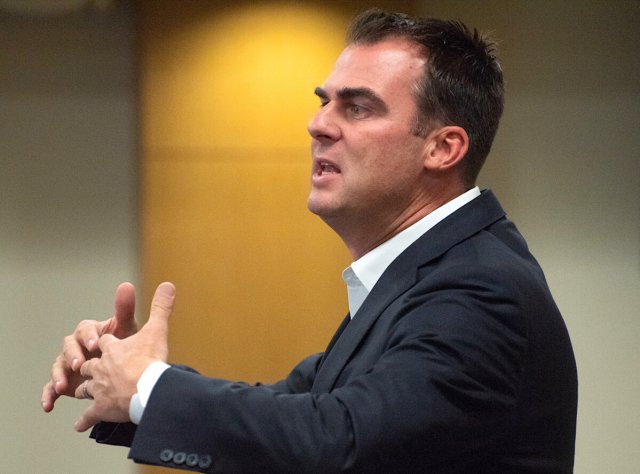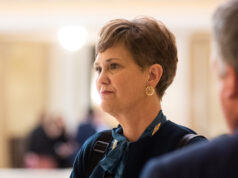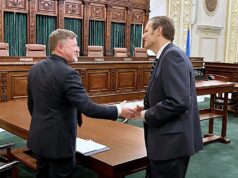
Gov. Kevin Stitt intends to open an Oklahoma field office in Washington and hire a full-time staff member to represent the state’s interests at the nation’s capital. Such action would mark the first time this century that Oklahoma had an executive-level employee dedicated specifically to state interests in D.C.
“Almost all other states have it. I don’t know what state doesn’t, to tell you the truth,” said Deputy Secretary of State Donelle Harder, herself a former Capitol Hill staffer. “There are a lot of federal dollars we need to be capturing right now that we’re not and a lot of things we need to be getting addressed in federal agencies to free up our abilities in the state, and we are not successful enough.”
Harder said Oklahoma’s congressional delegation works hard to represent the state’s interests, but often complex issues arise that require additional work directly with federal agencies.
“We’ve developed a federal agenda, but we need one person there focusing on it,” Harder said. “Even the congressional delegation, if you called and asked them, they are the ones advocating that they want a partner in D.C. with them. We are committing to ensure really good cohesion.”
Sanders on Washington liaison: D.C. is ‘all about relationships’
The Stitt administration is expected to begin the hiring process for its full-time Washington liaison in September. If the position is filled by the year’s end, it would be the first time in five and a half years that Oklahoma had any sort of designated Washington liaison.
When former Gov. Mary Fallin served as chairwoman of the National Governors’ Association from 2013-2014, a state employee named Chelsea Barnett served as Fallin’s deputy director for federal affairs and had an office in the Hall of States. Still, former Fallin staffers say only about half of Barnett’s time was devoted to Oklahoma-Washington issues.
Harder and state legislative leaders believe there is plenty of work to warrant a full-time Washington position.
“I think it’s a good idea,” said House Majority Leader Mike Sanders (R-Kingfisher). “I’m all in support of actually having boots on the ground because it’s all about relationships more than anything.”
Of any state lawmaker, Sanders would know, having worked in Washington from 2001 to 2007 in President George W. Bush’s administration. Sanders helped Bush rebuild the White House intern program that “had been disbanded in the Clinton administration for obvious reasons,” and he also worked for the U.S. Department of Agriculture in the areas of rural development and natural resource conservation.
“It’s very important to have a voice up there, not only for our folks on the federal side, but also someone who works for the governor and can speak directly for Oklahoma,” Sanders said. “The governor needs to know what is going on. There are bills up there, there are policies up there that he needs to know.”
Discussing why they believe a Washington liaison will be helpful, Sanders and Harder each highlighted recent drama between Oklahoma agencies and federal agencies. In 2017, the Oklahoma Department of Agriculture lost funding over a billing dispute with its federal partner. That same year, the federal Centers for Medicare and Medicaid Services announced a funding clawback owing to miscommunication over an expired waiver.
This year, CMS has sent a letter to the Oklahoma Health Care Authority claiming it has a right to some of the state’s opioid settlement dollars, and a state audit has brought to light confusion over how the Oklahoma Department of Human Services has been dealing with federal regulations for Temporary Assistance for Needy Families funding.
“A third of Oklahoma’s budget comes from the federal government, so we need someone who is keeping all eyes on how that is being spent, advocating to be sure we are getting the right dollars here to our state and not just randomly accepting D.C.’s priorities,” Harder said.
Treat: ‘A lot of potential areas to miscommunicate’
Senate President Pro Tempore Greg Treat (R-OKC) also worked at the federal level, though he was based in Oklahoma during his time on then-U.S. Sen. Tom Coburn’s staff. He, too, supports the Stitt administration’s plan.
“We have to have a strong relationship with our federal delegation. A lot of that is just by personalities,” Treat said. “Having somebody out there who is paying attention all the time is why I think [Gov. Stitt] thinks it is beneficial.”
Treat also pointed to state-federal snafus, such as the Oklahoma State Department of Health’s management of federal funds and the expired CMS waiver for the state’s teaching hospitals.
“There were a lot of potential areas to miscommunicate what our priorities as a state were to our federal designation, and it didn’t always work seamlessly,” Treat said. “So if we can have a central point of contact to be able to have one voice to our federal delegation, I think that can be very beneficial.”
Treat said different states have used Washington liaisons in different ways, so he will be watching the situation closely.
“Some have had really great success, and some have abandoned it after a few years,” he said. “I think Gov. Stitt has always picked really good people, so I’m excited to see what he has planned for it.”





















